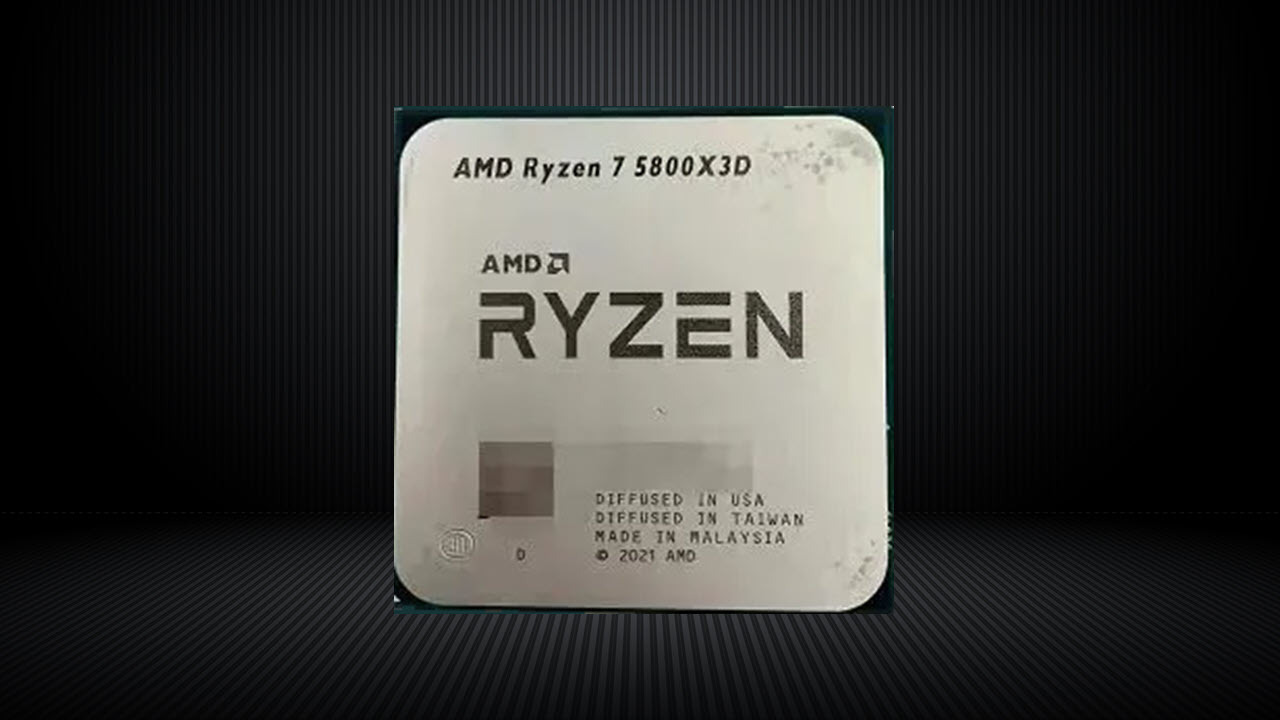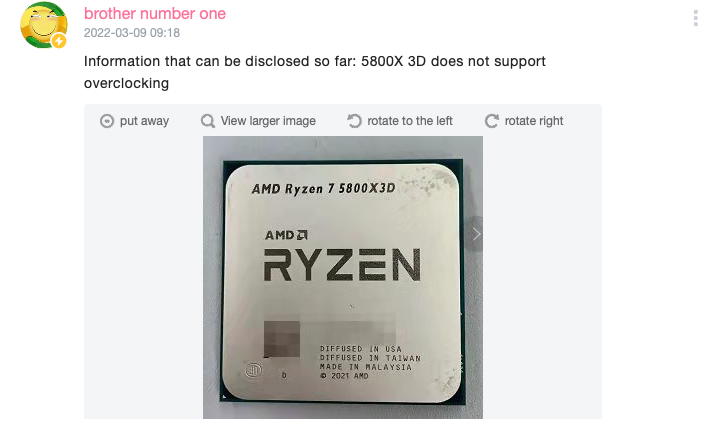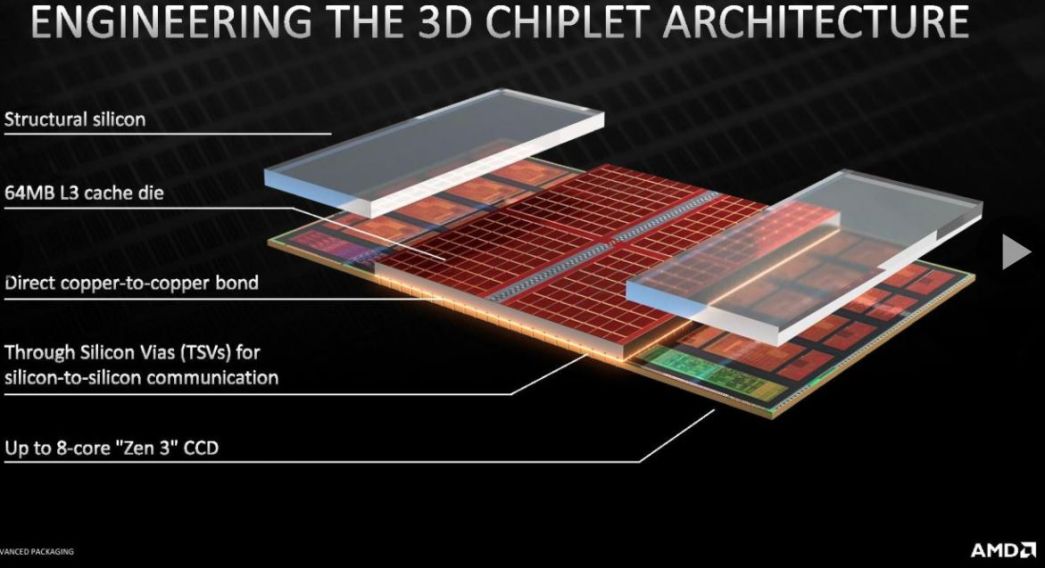AMD Ryzen 7 5800X3D Not Overclockable, Report Claims
Extra cache, but no extra clocks.

AMD's enthusiast-grade Ryzen 7 5800X3D processor with a massive 96MB L3 cache supports everything that the company's latest CPU series has to offer in an attempt to be the best CPU for gaming, but according to a post on Bilibili that also features the first known picture of the chip, the chip doesn't support overclocking. A recent video interview with AMD representatives also implies that this could be the case (below).

As you can see above, the Bilibili poster claims the chip isn't overclockable, which makes plenty of sense. When AMD announced its Ryzen 7 5800X3D processor several months ago, it emphasized its gargantuan 96MB L3 cache and increased single-thread performance thanks to fast memory accesses, an important factor for games. However, AMD didn't emphasize overclocking capabilities or clock rates compared to the regular Ryzen 7 5800X model.
Apparently, to add cache, AMD had to sacrifice clock speeds and may have also cut overclocking support. Additionally, AMD's website doesn't list the chip as overclockable, while it does list other models, like the standard 5800X, as overclockable.
TechPowerUp also claims that AMD is asking its motherboard partners to disable overclocking support for its Ryzen 7 5800X3D chip, as despite the X letter in its model number, it is not exactly overclocking friendly.
There are technical reasons why AMD's Ryzen 7 5800X3D had to lower clocks and disable overclocking. First, AMD places its 3D V-Cache on top of Zen 3's 'native' L3 cache and then connects them using through silicon vias (TSVs). This creates a non-uniform surface of the die, complicating positioning the integrated heat spreader (IHS) on top of the chip. To make it even, AMD places structural silicon spacers on top of Zen 3's processing cores, which limits their ability to dissipate heat. Yes, silicon does serve as a good thermal conductor, but it still traps a non-zero amount of heat between the die, structural silicon, and IHS.

Because a 64MB 3D V-Cache tile also adds to the power consumption, AMD had to lower the base clocks by 400 MHz to maintain a 105W default TDP. For the same reason, overclocking capabilities are likely also affected, so disabling overclocking support on X3D CPUs makes sense.
| Header Cell - Column 0 | Cores | Threads | L3 Cache | P-Core Base/Boost | TDP / PBP / MTP |
|---|---|---|---|---|
| Ryzen 7 5800X3D | 8P | 16 threads | 96MB | 3.4 / 4.5 GHz | 105W |
| Ryzen 7 5800X | 8P | 16 threads | 32MB | 3.8 / 4.7 GHz | 105W |
| Ryzen 9 5900X | 12P | 24 threads | 32MB | 3.7 / 4.8 GHz | 105W |
Finally, a recent video interview with AMD's Robert Hallock and Frank Azor could also be telling. As you can see at 7:55 in the above video, Azor asked Hallock about Ryzen 7 5800X3D overclocking back in January, but Hallock didn't confirm the feature. That implies that perhaps X3D models were simply not designed to be overclockable.
Stay On the Cutting Edge: Get the Tom's Hardware Newsletter
Get Tom's Hardware's best news and in-depth reviews, straight to your inbox.

Anton Shilov is a contributing writer at Tom’s Hardware. Over the past couple of decades, he has covered everything from CPUs and GPUs to supercomputers and from modern process technologies and latest fab tools to high-tech industry trends.
-
-Fran- The obvious question after that statement is: which part is not overclockable according to AMD? Is that just the consequence of how the clock management was developed?Reply
Also, in reality, there's no such thing as "not overclockable" IMO and it will depend on what is exposed to the motherboard in terms of voltage control, multipliers and such.
It's definitely not a good message to put out there, but I think the devil will be in the details.
Regards. -
superop lol lets hope this is not the case. who would buy this chip if that was the case. the current intel chips would smash this chip for the same or less cost.Reply -
digitalgriffin ReplyAdmin said:AMD's Ryzen 7 5800X3D features everything but the kitchen sink and overclocking.
AMD Ryzen 7 5800X3D Not Overclockable, Report Claims : Read more
Heat was always a concern of mine when I heard they were going to stack chips. Eventually backplate heatsinks are coming with an entirely new socket design to support it where CPU pads are outside the core area to allow an open area in the middle on both sides to cool. -
hotaru.hino The problem I'm finding with this is what "overclocking" even means anymore in a given context. Because in my eye, there's two types of overclocking:Reply
Forcing the CPU to run over its stock base speed, which I argue when placed in a vacuum, this is what "overclocking" should mean since this is how it's always been done.
Allowing the CPU to run over its advertised maximum turbo boost speed.In any case, if a "locked" AMD CPU simply means you can't change the multiplier past, in this case, 45, then you can still do base speed overclocking. Setting a value on the multiplier forces the CPU to run at that speed all the time. If it's say disabling PBO features or whatnot, a little more painful, but not exactly a huge loss considering you can barely push the maximum turbo speed on Ryzens anyway. Plus said maximum turbo speed is only good for the preferred cores. -
hannibal This is somewhat stupid claim... Even low end AMD CPU you can "OC"... Not much, but you can. The problem/advantage is that there is no point doing OC. The extra cache needs more power, so it may be even harder to OC 3dcache versions and 3d cache can cause OC bottleneck on its own depending on how closely the cache affect the cpu clockspeeds. All in all you need hefty LN2 or similar level cooling to OC anyways so it does not matter. I also expect that there are no OC locks, but just physical things that just make OC hard (like it is already with 5000 series).Reply
What i expect is that this is engineering sample and there quite often are some limitations with engineering samples... -
artk2219 Replysuperop said:lol lets hope this is not the case. who would buy this chip if that was the case. the current intel chips would smash this chip for the same or less cost.
PBO effectively makes manual overclocking mostly pointless, and hopefully theyll be a good upgrade option for anyone thats on a B450 board or newer. If youre happy with your current setup why change out your whole platform when you can just replace your cpu and get a nice performance lift? -
Friesiansam If your usage case would benefit greatly from the extra cache, I doubt the loss of clock speed is going to be a problem. Just make sure you cool it well enough, to ensure it runs as fast as possible.Reply -
cryoburner Reply
None of the latest high-end CPUs from either AMD or Intel have any significant overclocking headroom. Outside of temporary, exotic cooling solutions to push high scores on benchmark leaderboards, overclocking can just manage margin-of-error-level improvements at best, and performance regressions at worst. High-end CPUs are now being designed to get the most out of the silicon at stock, precisely adjusting clock rates and voltages on their own. And due to binning being performed on the chips at the factory, lower-grade silicon is put into more mid-range processors to match with their lower clock rates, so those are less likely to overclock significantly either. So really, overclocking support is mostly just being kept around at this point to check off a box on the product sheet to assure enthusiasts that a chip is in fact a higher-end model, even if there isn't much to be gained from it.superop said:lol lets hope this is not the case. who would buy this chip if that was the case. the current intel chips would smash this chip for the same or less cost.
And of course, AMD has stated that the 5800X3D will be the "World's Fastest Gaming CPU", so I don't think the Intel chips will "smash it", as it will likely hold the lead in at least some workloads. Whether that justifies its price is yet to be seen, but there are people who will pay a big premium for imperceptable performance gains, like those putting 12900Ks into gaming systems, rather than processors costing around half as much with very similar gaming performance. -
drea.drechsler As stated...overclocking is pretty much pointless anyway. The way to push my 5800X is undervolting with Curve Optimizer. So the question is: has AMD taken PBO and Curve Optimizer off the table too?Reply
It doesn't sound like a hardware lockout if AMD's asking board partners to not allow overclocking. I expect leaked...or hacked... BIOS's to show up for some boards anyway and attempts made.
